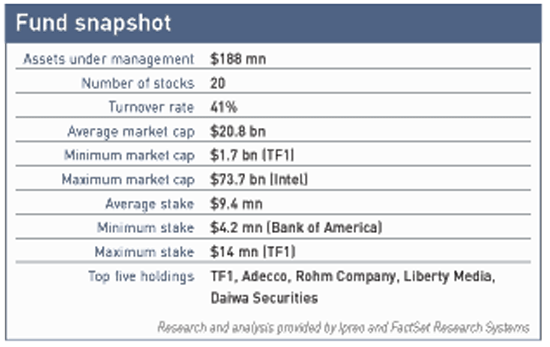With prices under water, now is the time to buy
When you’re in the middle of what some believe to be the biggest economic depression for 100 years, it’s good to talk to a cheery optimist like Oakmark fund manager David Herro.
‘This is a great opportunity to buy equities,’ says the Chicago-based investor. ‘Everything has leveled out; everything is cheap. You don’t need to look at turnaround stocks. It’s the right time to buy quality.’
Herro, 48, is a former meat salesman with a masters degree in economics. He’s probably best known for leading the coup against advertising icon Maurice Saatchi, chairman of Saatchi & Saatchi, from his own agency. Herro and other investors were no fans of the free-spending Saatchi who, in 1994, they felt was playing fast and loose with shareholder cash.
Herro cuts a more consensual figure these days, rarely challenging companies in public (it’s partly pragmatism – public spats don’t do the share price any good). ‘We don’t think of ourselves as activist shareholders,’ he says. ‘We try to invest with management teams that are building shareholder value. But our number one responsibility is to make money for shareholders. If it doesn’t make sense to sell, we will work with a board. It’s not for us to micro-manage the business.’
He manages a brace of funds, with the $188 mn Global Select Fund being a fair representative of the Oakmark stable; it has a 44 percent bias toward the US and sizable chunks in Asia and Europe. An average stake is around $9.4 mn from a fairly low overall number of stocks (20).
Feel the quality
Herro is partial to consumer services and health technology companies like Schering-Plough. ‘We take a bottom-up approach,’ he explains. ‘The object is to buy good-quality companies at low prices and then just be patient and wait. I define a good business as one with a good management team that has a good return on its sales base. The management should be good at allocating capital, but managements are often poor capital allocators.’
IR today is a very different animal from when Herro started his fund management career 24 years ago, but the role still demands more effort. ‘Some IROs could do better but others are spectacular,’ he notes. ‘What I want is timeliness and accuracy. Post data on your website, then break it down into company specifics – and the more openness, the better. It’s all about transparency.’
European companies take note: some French and Spanish firms are too slow and detail-shy. In terms of stellar IR practice, however, two companies from Herro’s portfolio shine. ‘One is a small-cap business in the UK called Carpetright, run by Lord Harris,’ Herro says. ‘He’s very good at capital allocation, and also communicates well.’
Signet, the UK jeweler, is another IR exemplar, he adds: ‘Tim Jackson, the firm’s IRO, is a role model for how all IROs should work. He provides very objective information and is very good on management strategy, which he really understands.’
Clear communication
Herro’s keen on a stable dividend policy and cash flow, which he believes send a message of confidence. ‘What companies should do generally is have a very transparent dividend policy,’ he explains. ‘Is it a fixed amount or a fixed payout? The investment community needs this to be clear.’ This is especially true during difficult times when the hunt for stable income intensifies.
This fund manager tries to avoid getting bogged down in market drama or short-term performance spurts and drop-offs. Instead, he scavenges the corners of a company CV for clues to how the firm will perform long term.
‘A company is a bit like the Mississippi river,’ he says. ‘At its source it’s four feet across; you can jump over it. But where it ends in New Orleans it turns into a big swamp thousands of feet wide. You can’t judge a company overall from any one point in time.’
Payment options
What you can do, however, is judge a company’s approach to executive compensation. Herro says Credit Suisse is one firm that has taken a new approach. Rather than management receiving bonuses in cash or equity shares, top Credit Suisse execs will receive a large amount of deferred compensation via a fund composed of their most illiquid commercial mortgage-backed securities and leveraged loans that still lie on the bank’s balance sheet.
These assets are depressed right now but Herro believes they should recover when credit markets stabilize. ‘It’s positive for shareholders because it links management pay to the long-term performance of credit markets, and limits the bank’s exposure to these illiquid securities,’ he says.
Looking for clues to when the broader economy will recover, however, is like trying to time the market. Many think global capitalism remains on the edge of a prolonged depression, but Herro thinks the Grinches are over-doing the gloom factor. He says a more confident US dollar, low oil prices and P/E values on trailing earnings all make a strong case for recovery in the near future.
‘Plus, we have all this fiscal stimulus from government,’ Herro points out. ‘Companies in the emerging markets are now becoming real players. And as for what technology continues to do…’
In the meantime, poker-faced sobriety rules. Around 100 say-on-pay shareholder resolutions have been tabled for the annual meetings season; superstar pay is under attack from all investors. ‘We are going to see more cautious behavior in the medium term, over the next two to six years,’ Herro says.
And beyond that? ‘When things get good again there will be more excesses,’ he adds. Right now, though, that seems some distance off.
For more on Oakmark funds visit: www.oakmark.com











